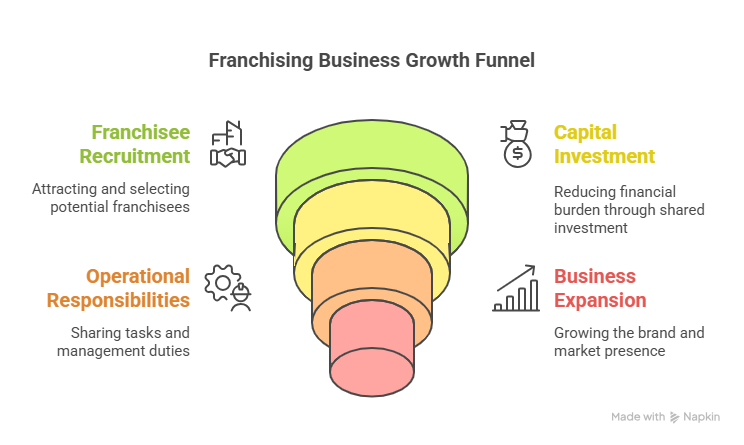Why Start a Franchise Business?
Start Franchise Business offers a proven model for business expansion. By allowing franchisees to operate under your brand, you can grow your business with reduced capital investment and shared operational responsibilities. This model benefits both franchisors and franchisees, providing a win-win scenario for business growth.

Benefits of the Franchise Model
When you Start Franchise Business, you unlock a growth model that balances scalability with efficiency. Franchising allows entrepreneurs to expand their brand into new markets without the heavy capital burden typically associated with opening company-owned branches. Instead, franchisees invest their own resources, which fuels expansion while spreading financial risk. This collaborative approach not only accelerates brand presence but also empowers franchisees to take ownership of operations, often resulting in higher motivation and better performance.
Moreover, franchising enhances customer experience consistency. When supported with well-defined training and operational guidelines, franchises mirror the core values, products, and services of the parent brand. This consistency builds trust among customers, helping your brand gain credibility across multiple locations. In addition, franchisors can leverage feedback and insights from different regions to refine products or services, fostering innovation and adaptability.
Steps to Start a Franchise Business
1. Assess Your Business Model
Before franchising, evaluate if your business is ready:
- Profitability: Ensure consistent financial performance.
- Replicability: Your business processes should be easy to duplicate.
- Market Demand: Confirm that there’s a demand for your product or service in other regions.
2. Conduct Market Research
Understand the competitive landscape:
- Target Demographics: Identify who your potential customers are.
- Competitor Analysis: Study existing franchises in your industry.
- Location Viability: Determine where your franchise would thrive.
3. Develop Legal Documentation
Legal preparedness is crucial:
- Franchise Disclosure Document (FDD): Provides prospective franchisees with essential information.
- Franchise Agreement: Outlines the terms and conditions between franchisor and franchisee.
4. Protect Your Intellectual Property
Safeguard your brand:
- Trademarks: Register your brand name and logo.
- Patents: If applicable, protect unique products or processes.
5. Create an Operations Manual
This manual ensures consistency across franchises:
- Standard Operating Procedures: Detail daily operations.
- Brand Guidelines: Maintain uniform branding.
- Training Modules: Provide comprehensive training for franchisees.
6. Establish Training Programs
Equip franchisees with the necessary skills:
- Initial Training: Covering operations, customer service, and management.
- Ongoing Support: Regular updates and training sessions to keep franchisees informed.
7. Determine Financial Structure
Set clear financial expectations:
8. Develop a Marketing Strategy
Promote your franchise effectively:
- Digital Marketing: Utilize social media and SEO.
- Franchise Expos: Participate in industry events.
- Public Relations: Build brand awareness through media coverage.
9. Recruit Franchisees
Find the right partners:
- Application Process: Screen potential franchisees thoroughly.
- Interviews: Assess compatibility and commitment.
- Selection Criteria: Evaluate financial stability and business acumen.
10. Launch and Support Franchisees
Ensure successful operations:
- Grand Opening Assistance: Help with initial setup and promotions.
- Continuous Support: Provide ongoing operational and marketing assistance.
- Performance Monitoring: Regularly assess franchisee performance and provide feedback.
Key Success Factors in Franchising
To successfully Start Franchise Business, certain critical factors must be addressed from the outset. One of the most vital elements is brand strength. A recognizable and trusted brand gives franchisees a competitive edge and encourages customer loyalty from day one. Investing in brand development, both online and offline, is therefore crucial.
Another success factor is a clear and structured support system. Franchisees are more likely to succeed when they receive robust initial training, continuous operational guidance, and access to centralized resources. Support structures like help desks, field managers, and ongoing marketing assistance ensure franchisees don’t feel isolated and can meet brand standards consistently.
Financial transparency also plays a major role. Franchisors should clearly communicate all expected costs, from franchise fees to marketing contributions. A transparent and well-structured financial model builds trust and helps prospective franchisees make informed decisions. Legal clarity, particularly around the franchise agreement and disclosure document, protects both parties and sets the foundation for a strong business relationship.
Technology and Innovation
In today’s competitive landscape, integrating technology is essential when you Start Franchise Business. A centralized digital infrastructure enables real-time monitoring of franchise performance, customer feedback, inventory, and compliance metrics. Many modern franchises use cloud-based POS systems, CRM tools, and training portals to streamline operations and maintain brand consistency.
Marketing automation and data analytics further enhance franchise operations. With centralized digital campaigns, franchisors can maintain cohesive branding while allowing localized customization. Data collected across franchise units can be used to optimize pricing, promotions, and customer engagement strategies.
Additionally, innovation in service delivery — such as mobile apps, e-commerce integration, and loyalty programs — can significantly elevate the customer experience. By staying updated with trends and adopting the right technology stack, franchisors can create a modern, scalable, and customer-centric franchise network.
Conclusion
Start Franchise Business requires careful planning, legal compliance, and ongoing support. By following these steps, you can establish a successful franchise that benefits both you and your franchisees. Remember, the key to a thriving franchise lies in consistent quality, strong branding, and mutual growth.
